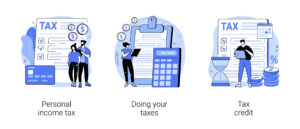Unstable Stock Market Could Hurt State Tax Budgets

While many feel the wealthy should be paying more in taxes, the efforts to enforce this strategy does have some consequences for state budgets. Many of the country’s wealthiest individuals hold the majority of their wealth in stocks. That means when the stock market goes down, so do the tax payments of the wealthy.
In fact, several states are currently feeling a pinch in their budgets thanks to the less than favorable conditions of the market. For example, Connecticut governor Dannel Malloy announced budget cuts late last year blaming the stock market’s lackluster performance. Budget analysts expect at least a $200 million deficit, and the governor has already announced several cutbacks.
Meanwhile, in California, the state is also expecting less revenue from capital gains this year and in New York lawmakers have been told to lower their expectations for the state’s upcoming fiscal year. While not all states are affected by the stock market, those that count many of the wealthiest individuals as residents can be hurt dramatically when the stock market takes a downturn.
Another sign that higher taxes could be hurting states’ budgets is happening in Connecticut where some lawmakers believe that many of the state’s wealthiest individuals are moving to other states in order to avoid Connecticut’s high tax rates on the wealthy. With so many high net earners in the state being affected by new efforts to raise taxes on the wealthy, the state’s budget is taking an even greater hit.
Income the IRS Can’t Touch
Income the IRS Can’t Touch There’s one readily available and legal source of untaxed income that we know of: municipal bonds. These securities are issued by state and local governments, school districts, hospitals and other public agencies to support community projects and services. To permit these worthy endeavors to raise money economically, Uncle Sam exempts…
Avoiding Real Estate Tax Revaluations
Avoiding Real Estate Tax Revaluations by Steven Singer, CPA As a result of the passage of Proposition 13 almost thirty years ago, real estate owners currently enjoy paying property taxes based on the property’s purchase price, value of improvements and an annual increase of 2% over the previous years’ assessed value. As a result of…
Annuities in Qualified Retirement Plans
Annuities in Qualified Retirement Plans By Russell Hill Using annuities in qualified retirement plans. Qualified annuities reduce your current taxable salary in addition to accumulating tax deferred earnings, when you contribute money to an annuities program through an employer (as one of the investment options in a salary reduction retirement plan). Those who work for…
Paying Too Much In Taxes?
Paying Too Much In Taxes? By Theodore Lanzaro Now that the end of the year is near, it is time to review a few business tax tips for 2008. Anyone who owns a business or is planning to start a new business in 2008 should be thinking about maximizing the profitability of their business and…


